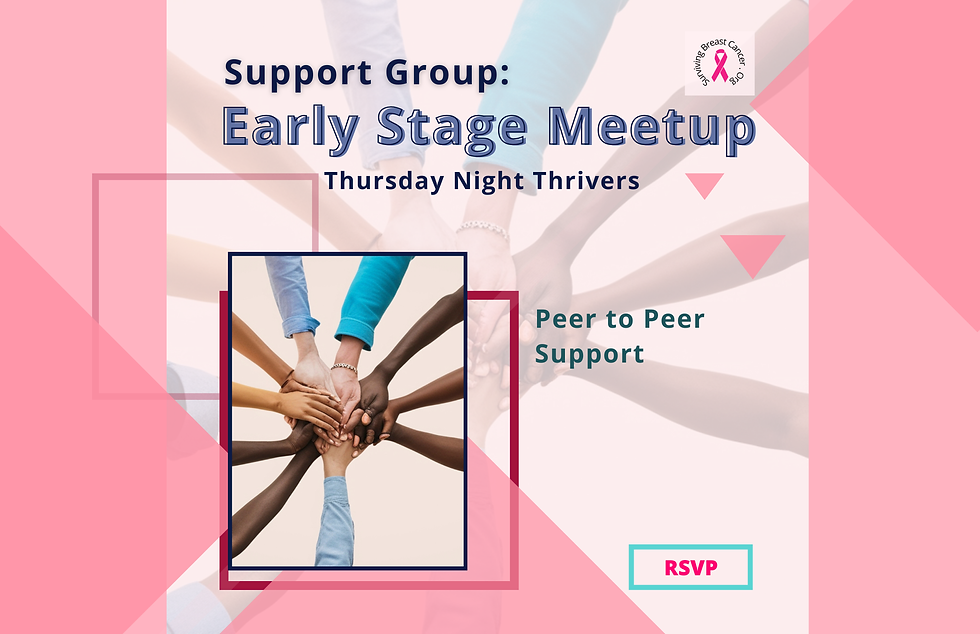Breast Cancer and No Family History
- Surviving Breast Cancer

- Aug 7, 2022
- 4 min read
By Linda Hansen
I never worried about breast cancer. No one in my family ever had it, so I was sure that I was low risk. I got annual mammograms, and they were always clear. None of my physicians ever said anything to suggest that I should be concerned. After all, I was low risk. When I hit menopause and had horrible hot flashes that kept me from sleeping, my doctor suggested hormone replacement therapy (HRT). I knew that HRT increased the risk of breast cancer, but the doctor said I should try it. After all, I was low risk. Soon after starting HRT, the hot flashes stopped, and I was soon sleeping again, and able to function. I wasn’t worried about HRT’s impact on breast cancer because I was low risk. Two years passed on HRT, and I kept getting annual mammograms that were clear. I didn’t worry, because I was low risk.
I tried to do some exercise and eat reasonably well as I got older. Then again, I live in a state known for deep-fried cheese and bratwurst. Even so, in May of 2010, when I was 54 years old, I decided to try jogging. I was surprised to note that every time my right foot hit the pavement, I felt a brief pain in my right breast. I wondered what it was, but because I was low risk and I’d had a clear mammogram just five weeks earlier, I didn’t worry about breast cancer.

When I got home from jogging, I checked my breasts while in the shower. I didn’t feel anything unusual, but that was expected since I was low risk. I got out of the shower, and as I applied deodorant, I noticed that a dent appeared in my right breast as I raised my right arm. When I put my right arm down, the dent went away. I was sure that it wasn’t breast cancer, but I was curious about what it might be. Rather than doing a typical exam as instructed by my doctor, I squeezed both breasts from the sides. I noted that the right breast seemed denser than the left. Although I knew I was low risk for breast cancer, it was time to call a doctor.
The following morning I met with my gynecologist and explained my symptoms. He did a breast exam, and I showed him how I found the density. He said he could feel what I described, and told me he would be right back. I wasn’t concerned, after all, I was low risk for breast cancer, but I was curious. The doctor returned a few minutes later, holding a piece of paper. He handed the paper to me and told me that I had an appointment with a breast surgeon Monday morning. The paper contained all of the details. Although I was low risk for breast cancer, I was starting to get concerned.
I didn’t tell anyone about what was happening with me, as I knew my family and friends might worry even though I was certain that I would be fine. Monday morning I went to the hospital to meet the breast surgeon. She examined my breasts and told me that I needed an MRI. The hospital would not schedule the MRI until they were sure my insurer would pay for it. For three weeks my doctor argued with the insurance company about the need for an MRI. Finally, it was scheduled.
If you’ve never had a breast MRI, you’re missing a real treat. A wooden structure was placed on the “bed” of the MRI. It looked like a cornhole board but had two holes across the top rather than one. I was told to open my hospital gown and lie on the board so that my breasts hung through the holes. A tech reached underneath and tugged on my breasts to get them in the position that she wanted. I’m from Wisconsin, so I’ve spent time on a dairy farm at milking time. As the tech pulled my breasts I did the first thing that came to mind: I let out a long “Moo!”
My breast surgeon hung the MRI film on the light box at my next appointment. I didn’t need any medical training to know that something was wrong: one breast appeared nearly black and the other appeared white. Looking at the films, I asked “Other than breast cancer, what could this be?” She responded bluntly. “I think you have breast cancer, but I can’t be sure until I biopsy it.” I was stunned. Didn’t she understand that I was low risk? This couldn’t be right. But eventually I learned that breast cancer doesn’t care if you’re low risk, and low risk doesn’t equal no risk.
Life as I knew it quickly changed. I was diagnosed with stage IV breast cancer in June of 2010. I opted for aggressive treatment and more than 10 years later there is no evidence of disease on my scans. I’m doing well and enjoying every day. Carpe Diem!










